NCERT Exemplar Solutions Class 8 Science Chapter 10 – Free PDF Download
NCERT Exemplar Solutions for Class 8 Science Chapter 10 Reaching the Age of Adolescence aid you in gaining in-depth knowledge of the topic included in the CBSE Class 8 syllabus. By practising these NCERT Exemplar Solutions, you will be able to get a stronghold on the basic topics and will be able to answer the questions in the annual examination easily. This NCERT Exemplar for Class 8 Science Chapter 10 helps you in practising various types of questions, such as MCQs, match the following, fill in the blanks, and HOTS questions for Class 8 Science Chapter 10 Reaching the Age of Adolescence.
Reaching the Age of Adolescence is one of the most important chapters of Biology. In this chapter, students will learn about different changes that will occur in their puberty, like an increase in height, voice change, change in body shape, development of sex organs, and secondary sexual changes. To master the concepts of this chapter, they are advised to solve the questions from the NCERT Exemplar for Class 8 Chapter 10, Reaching the Age of Adolescence.
Download the PDF of NCERT Exemplar Solutions for Class 8 Science Chapter 10 – Reaching the Age of Adolescence
Access Answers to NCERT Exemplar Solutions for Class 8 Science Chapter 10 – Reaching the Age of Adolescence
Multiple Choice Questions
1. The belief that the mother is completely responsible for the sex of the child is wrong because the child
(a) gets sex chromosome only from the mother.
(b) develops in the body of the mother.
(c) gets one sex chromosome from the mother and the other from the father.
(d) gets sex chromosome only from the father.
Soln:
Answer is (c) gets one sex chromosome from the mother and the other from the father.
Explanation:
Mother has a pair of the X chromosome on their 23rd chromosome set and she always donates X chromosome to the offspring. Father has an XY chromosome on the 23rd set. If father donates X chromosome, the child will be female. If Father donates Y chromosome then the child will be male. Hence it is the father who is responsible for the sex of the child.
2. AIDS can spread from an infected person to another person through:
(a) sharing food
(b) blood transfusion
(c) sharing comb
(d) a mosquito bite
Soln:
The answer is (b) blood transfusion
Explanation:
AIDS can be transmitted from an infected person by the following means:
- Sharing needles and syringes
- From infected mother to foetus.
- By sexual means through the exchange of fluids.
- From an infected mother to a baby through breast milk.
3. Given below are events that lead to pregnancy and development of the embryo.
i)Fertilization of egg
ii)Maturation of egg
iii)Release of egg
iv)Embedding of the embryo in the thickened uterine wall.
Which of the following options gives the correct order of sequence in which they occur?
(a) i, ii, iii, iv,
(b) ii, i, iii, iv
(c) i, iv, ii, iii
(d) ii, iii, i, iv
Soln:
Answer is (d) ii, iii, i, iv
Explanation:
The sequence of events is as follows:
1. Maturation of egg after puberty.
2. Release of the egg cell.
3. Fertilization of the egg by sperm to form the zygote.
4. Repeated division of zygote to form an embryo.
5. Embryo gets embedded in the wall of the uterus for further development.
4. For the metamorphosis of tadpoles which of the following elements must be available in the water?
(a) chlorine
(b) carbon
(c) sulphur
(d) iodine
Soln:
The answer is (d) iodine
Explanation:
Metamorphosis is brought by a hormone called thyroxine. The thyroid gland needs Iodine to secrete Thyroxine. Hence Iodine should be present in water for the metamorphosis of tadpoles.
5. The most conspicuous visible change that occurs in boys during puberty is:
(a) development in the voice box.
(b) increase in height.
(c) production of sperms.
(d) increased sweating.
Soln:
The answer is (b) increase in height.
Explanation:
The most conspicuous change during puberty is the sudden increase in height. At this time, the long bones, that is, the bones of the arms and the legs, elongate and make a person tall.
6. Structures present in a cell which is responsible for determination of the sex of a baby is
(a) cytoplasm
(b) cell membrane
(c) nucleus
(d) chromosome
Soln:
The answer is (d) chromosome
Explanation:
23rd set of the chromosome which is called a sex chromosome determines the sex of the child. If 23rd set of the chromosome is XX baby will be female and if sex chromosome is XY then the baby will be a boy.
Very Short Answer Questions
7. Unscramble the underlined words in the following sentences.
(a) Reproductive life of a woman lasts from hacreemn to spauoemen.
(b) The development of a caterpillar to an adult butterfly is termed as poommertaissh.
(c) The overgrowth of sumselc in xalnyr leads to the hoarse voice in adolescent boys.
(d) Dannalier helps the body to adjust and fight the stress.
Soln:
(a) menarche, menopause
(b) metamorphosis
(c) muscles, larynx
(d) Adrenalin
8. Complete the following sentences.
(a) In females, the uterine wall thickens to receive the __________.
(b) Endocrine glands release hormones directly into___________for transportation to the __________.
(c) The sex hormones,_______________________ and estrogen are responsible for the development of __________ characters.
(d) Release of sex hormones is under the control of a hormone secreted from the __________.
Soln:
(a) In females, the uterine wall thickens to receive the fertilized egg.
(b) Endocrine glands release hormones directly into the bloodstream for transportation to the target site.
(c) The sex hormones, Testosterone, estrogen and estrogen are responsible for the development of secondary sexual characters.
(d) Release of sex hormones is under the control of a hormone secreted from the pituitary gland.
9. Give a suitable word for each of the following statements.
(a) The site which responds to a hormone.
(b) Name of a gland which transports secretions through ducts.
(c) Chemicals which control changes at the adolescence stage.
(d) It marks the beginning of the reproductive period.
Soln:
(a) Target site
(b) Sweat glands/salivary glands/oil glands (anyone)
(c) Hormones
(d) Puberty
10. Name the hormone that is released by testes at the onset of puberty.
Soln:
Testosterone is the hormone that is released by testes at the onset of puberty
11. Name the female hormone produced by ovaries that helps in the development of mammary glands
Soln:
Estrogen is the female hormone produced by ovaries that helps in the development of mammary glands.
Short Answer Questions
12. Match the hormones given in Column A with their deficiency disease given in Column B.
| Column A | Column B |
| (a) thyroxine | (i) salt imbalance |
| (b) growth hormone | (ii) diabetes |
| (c) Insulin | (iii) goitre |
| (d) Adrenal hormone | (iv) Dwarfism |
Soln:
| Column A | Column B |
| (a)Thyroxine | (i) Salt imbalance |
| (b) Growth hormone | (iv) Dwarfism |
| (c) Insulin | (ii) Diabetes |
| (d) Adrenal hormone | (i) Salt imbalance |
13. Lila always eats only dal and rice in every meal. She often falls ill and has become prone to diseases. Can you suggest changes in her diet which can make her healthy and free from disease?
Soln:
The food Lila takes every day consists of only carbohydrates and proteins. To be free from disease, Lila should eat food with vitamins and minerals. She should include more vegetables and fruits in her daily diet.
14. Mention any two features that are seen in boys and girls to distinguish them from each other at puberty.
Soln:
Two features seen in boys at puberty are:
- Growth of facial hairs
- The voice becomes hoarse.
Two features seen in girls at puberty are:
- Breast development.
- The region below the waist becomes wider.
15. We should avoid taking medicines/drugs unless prescribed by a doctor. Give reasons.
Soln:
We should not take medicines/drugs unless prescribed by a doctor because some medicines have various side effects, which may also lead to adverse effects, or can get addicted to drugs, which ruin our health and happiness.
16. A few of Paheli’s classmates eat potato chips and burgers regularly during recess at school. Are they healthy eating habits? Give reasons.
Soln:
No. Potato chips and burgers are not healthy as it contains very little nutritional value in them and is not good foods to eat it regularly.
17. Read the statements given below and fill up the blanks with the correct words listed in the box.

(a) The meal that includes all __________ is a balanced diet.
(b) Insufficient production of __________ in the tadpoles leads to their incomplete development.
(c) Endocrine glands are also called __________ glands.
(d) After attaining puberty boys develop a__________ voice
Soln:
(a) The meal that includes all nutrients is a balanced diet.
(b) Insufficient production of thyroxine in the tadpoles leads to their incomplete development.
(c) Endocrine glands are also called ductless glands.
(d) After attaining puberty, boys develop a deep voice
18. Fill in the blank circles in figure 10.1 and identify the sex of children A and B.

Soln:

Lord Answer Questions
19. During adolescence, the body of boys and girls undergoes certain changes. Given below are a few of those changes.
(a) Broad shoulders
(b) Wider chests
(c) The wider region below the waist
(d) Development of muscles
(e) Development of mammary glands
(f) Growth of facial hair
(g) Acne and pimples on the face
(h) Development of sex organs
(i) High-pitched voice
(j) Growth of pubic hair.
Categorise these changes according to their occurrence in boys and those that occur in girls and fill in the table given below.
Soln:
| Body Changes | |
| Boys | Girls |
| Broad shoulders | The wider region below the waist |
| Wider chests | Development of mammary glands |
| Growth of muscles | Acne and pimples on the face |
| Growth of facial hair | Development of sex organs |
| Acne and pimples on the face | High-pitched voice |
| Development of sex organs | Development of pubic hair |
| Development of pubic hair |
20. In Fig.10.2, mark the positions of the endocrine glands which release the hormones that:
(a) controls the release of sex hormones.
(b) is responsible for the secondary sexual characters in boys.
(c) prevents diabetes.
(d) maintains the correct salt balance in the blood.
Soln:
- Pituitary gland
- Testis
- Pancreas
- Adrenal gland

21. Given below are certain food items required for proper nourishment of adolescents. Name the nutrients present in the food items and write their functions.
| S. No. | Food items | Major nutrients | Functions |
| 1 | Pulses and nuts | ||
| 2 | Oranges and Amla | ||
| 3 | Sugar, Roti | ||
| 4 | Oils | ||
| 5 | Vegetables |
Soln:
| S. No. | Food items | Major nutrients | Functions |
| 1 | Pulses and nuts | Proteins | Growth, repair of body
cells |
| 2 | Oranges and Amla | Iron And Vitamins | Formation of blood keeps the body healthy |
| 3 | Sugar, Roti | Carbohydrates | Provide energy |
| 4 | Oils | Fats | Provide energy |
| 5 | Vegetables | Vitamins and minerals | Keeps the body healthy and disease-free |
22. Name the hormone which would be released during the following situations:
(a) a frightened person.
(b) growth of a child to an adult.
(c) development of caterpillar to moth.
(d) development of tadpole to frog.
Soln:
(a) Adrenaline- This hormone is released when a person is frightened.
(b) Growth hormone- It is responsible for the growth of a child to an adult.
(c) Insect hormones-This hormone is responsible for the development of caterpillar to moth.
(d) Thyroxine –It is responsible for the development of tadpoles to frog.
23. In human females, each time during maturation and release of the egg the inner wall of the uterus thickens. Is this thickening permanent? Give reasons.
Soln:
Thickening of uterus wall is not permanent. Upon fertilization, zygote starts developing and gets embedded in the uterus wall. This results in pregnancy. During pregnancy, no more ore eggs are released thickened uterine lining is released after the delivery of the baby.
24. John and Radha have been classmates since childhood. When Radha was eleven years old, she developed a little swelling on her neck. She visited the doctor who started medication for her. After a few years, John also developed a slight protrusion on his throat. He got worried and went to the doctor. But, the doctor assured him that it was a normal feature in boys while they are growing up. Can you think of any reasons for the difference in diagnoses?
Soln:
Goitre may be the reason behind swelling of Radha’s neck Goitre is the condition of the thyroid gland during which the gland produces an insufficient quantity of thyroxine. In the case of JOHN’s swelling of neck maybe because of Adam’s apple which is the result of the growth of voice box in adolescent boys.
25. Observe the chart and graph given in Fig. 10.3 carefully and answer the following questions.


(a) Which of the line represents the height of boys?
(b) Which line represents the height of girls?
(c) What is the difference between the pattern of increase in the height of boys and girls?
(d) Is this pattern true for each individual?
Soln:
(a) The red line represents the height of boys.
(b) The blue line represents the height of girls.
(c) At the onset of puberty, girls grow faster in height than the boys and by the age of 18 years, approximately both reach their maximum height.
(d) No, the rate of growth in height varies among individuals. Some may grow in height suddenly at puberty and then slow down, while others may grow gradually.
26. Salma had a very soft and smooth skin during her childhood. As she entered adolescence, she developed pimples on her face. The skin specialist advised her to wash her face at regular intervals. Can you explain the reasons for the appearance of pimples on her face and suggest ways to prevent them?
Soln:
After adolescence, sweat glands and sebaceous glands increase their secretion. As Salma entered adolescence, her sweat gland and sebaceous glands increased their secretion, which resulted in the pimples on her face. Regular face wash can keep the face clean and dry, which will help Salma to get rid of pimples.
27. Our government has legalised the age for marriage in boys and girls. Give reasons as to why one should get married after a certain age.
Soln:
In India marriage age for girls is 18 years, and for boys, it is 21. At age 18, girls are not mature enough physically as well as mentally to carry motherhood. Early motherhood will adversely affect both the mother and the child. For boys, it is 21 as at an early age, they are not mature enough mentally and they are not stable enough financially.
28. It is believed that the height of a child depends upon the genes inherited from parents. However, it is often seen that tall parents may have short children and vice-versa. Are there factors other than genes, that can cause these variations?
Soln:
The height of a person is not just relying on hereditary character. It depends on the type of food they eat. The physical exercise they do. Secretion levels of various growth hormones. The disease they encounter in their life.
Subtopics of Class 8 Science Chapter 10 Solutions for the Chapter Reaching the Age of Adolescence
| Section Number | Topics |
| 10.1 | Adolescence and Puberty |
| 10.2 | Changes at Puberty |
| 10.3 | Secondary Sexual Characters |
| 10.4 | Role of Hormones in Initiating Reproductive Function |
| 10.5 | Reproductive Phase of Life in Humans |
| 10.6 | How is the Sex of the Baby Determined |
| 10.7 | Hormones other than Sex Hormones |
| 10.8 | Role of Hormones in Completing the Life History of Insects and Frogs |
| 10.9 | Reproductive Health |
We, at BYJU’S, provide free NCERT Exemplars, which are available chapter-wise to help students in their academics. Students can easily download these NCERT Exemplar Solutions, which are available in PDF and practise more questions to ace their CBSE annual exams. Apart from the solved textbook questions, at BYJU’S, they can find important questions, Biology chapter notes, previous years’ question papers, tips, and guidance to prepare for their exams.
| Also Access |
| NCERT Solutions for Class 8 Science Chapter 10 |
| CBSE Notes for Class 8 Science Chapter 10 |
Frequently Asked Questions on NCERT Exemplar Solutions for Class 8 Science Chapter 10
Do the NCERT Exemplar Solutions for Class 8 Science Chapter 10 help students grasp the features of adolescence?
What are the topics and subtopics covered in Chapter 10 of NCERT Exemplar Solutions for Class 8 Science?
10.1 Adolescence and Puberty
10.2 Changes at Puberty
10.3 Secondary Sexual Characters
10.4 Role of Hormones in Initiating Reproductive Function
10.5 Reproductive Phase of Life in Humans
10.6 How is the Sex of the Baby Determined
10.7 Hormones other than Sex Hormones
10.8 Role of Hormones in Completing the Life History of Insects and Frogs
10.9 Reproductive Health
Why should I use the NCERT Exemplar Solutions for Class 8 Science Chapter 10 PDF from BYJU’S?
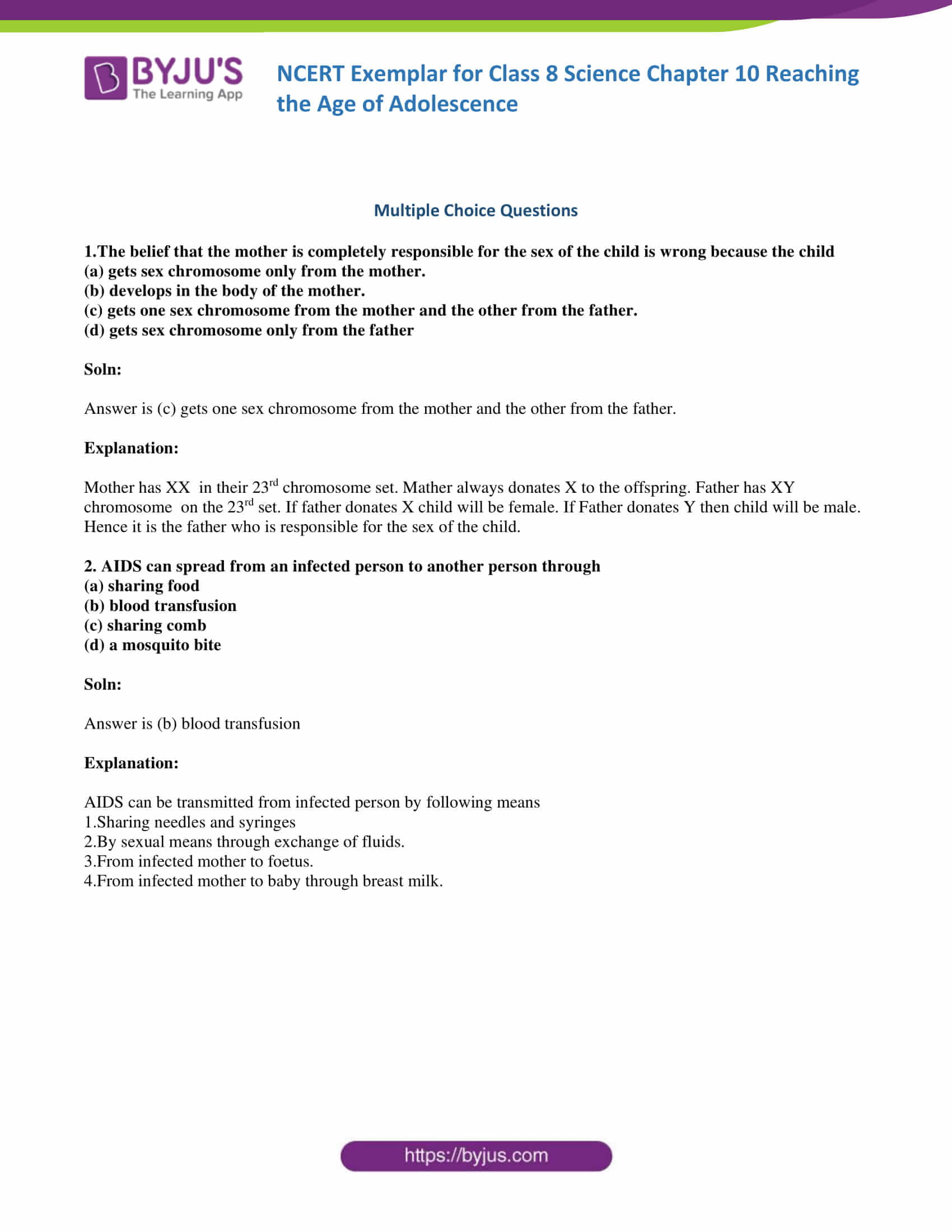
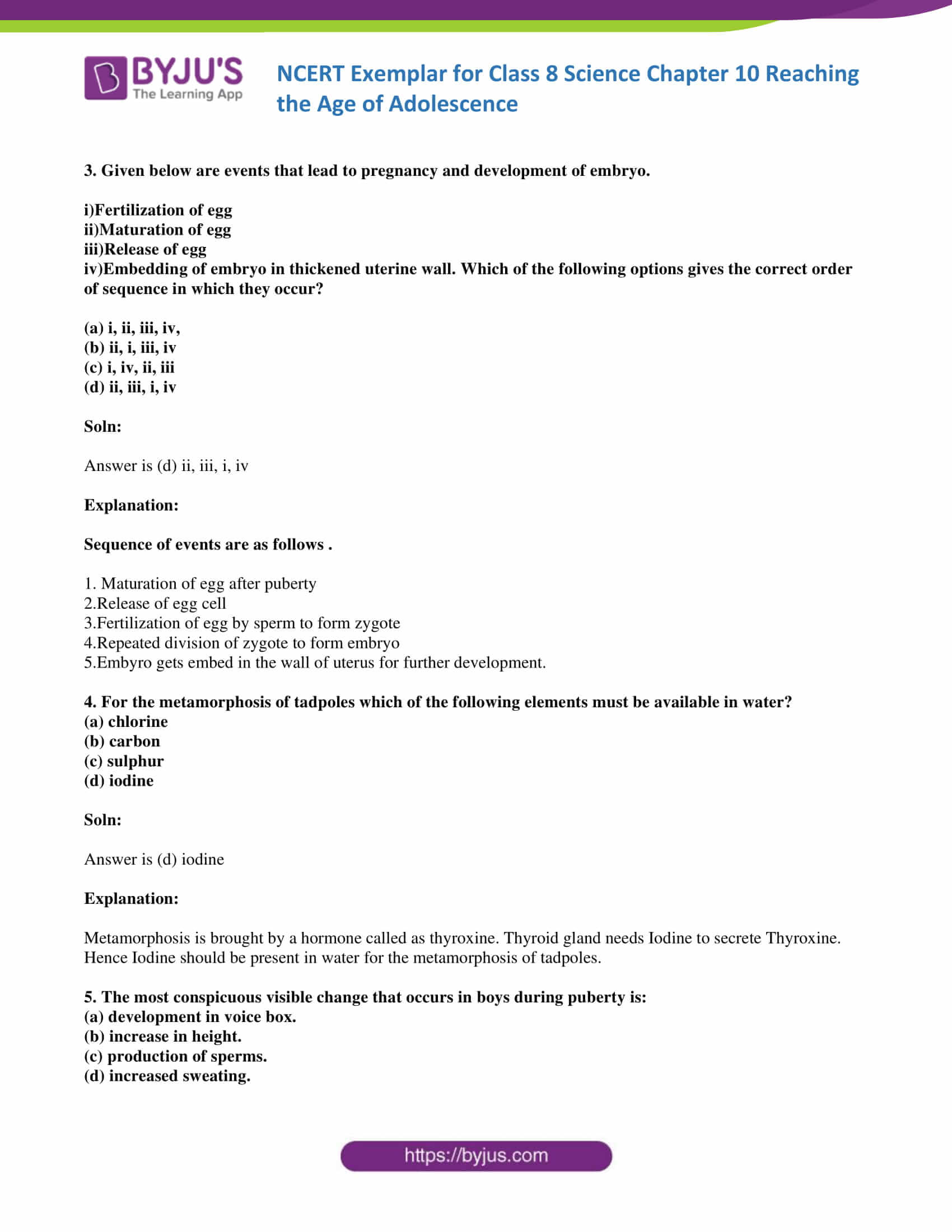
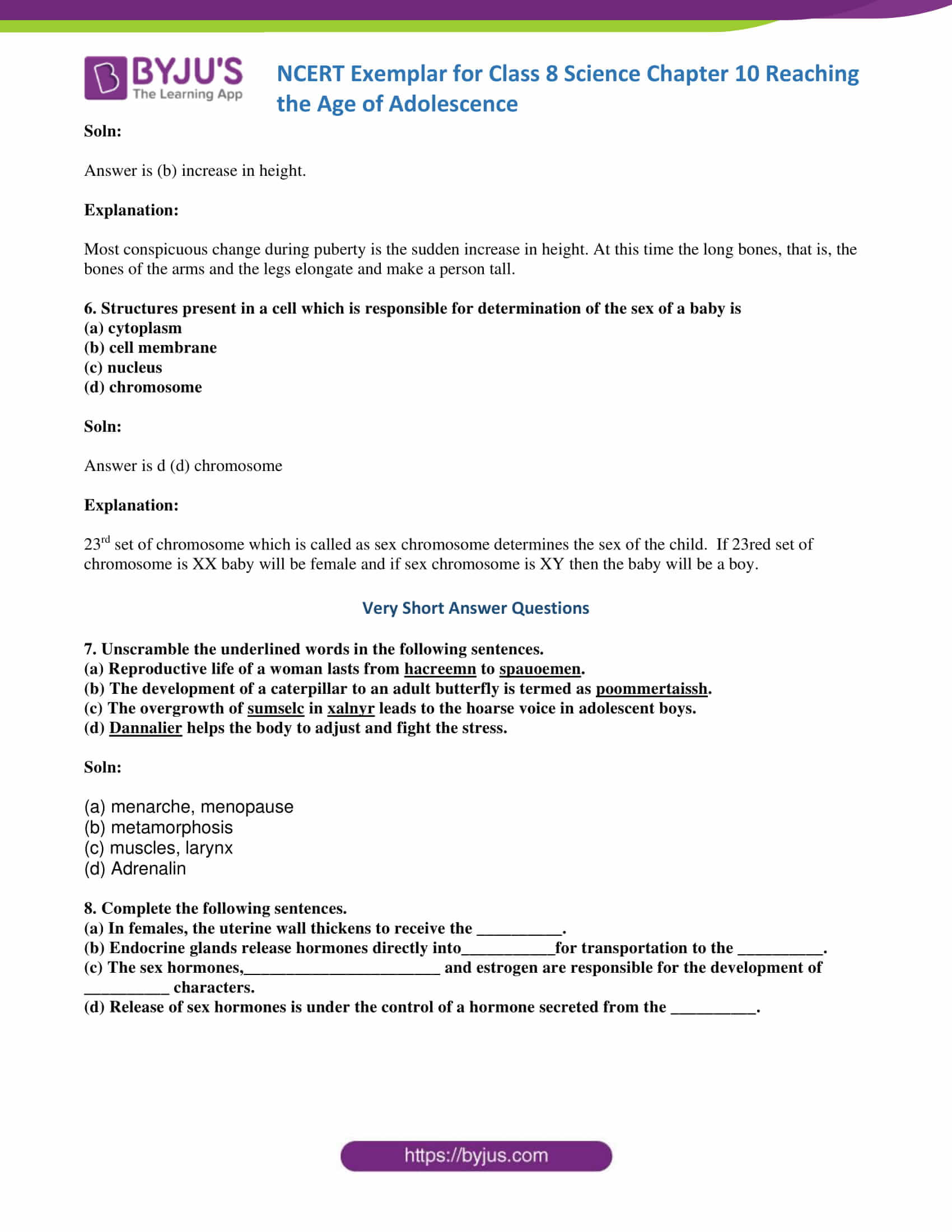
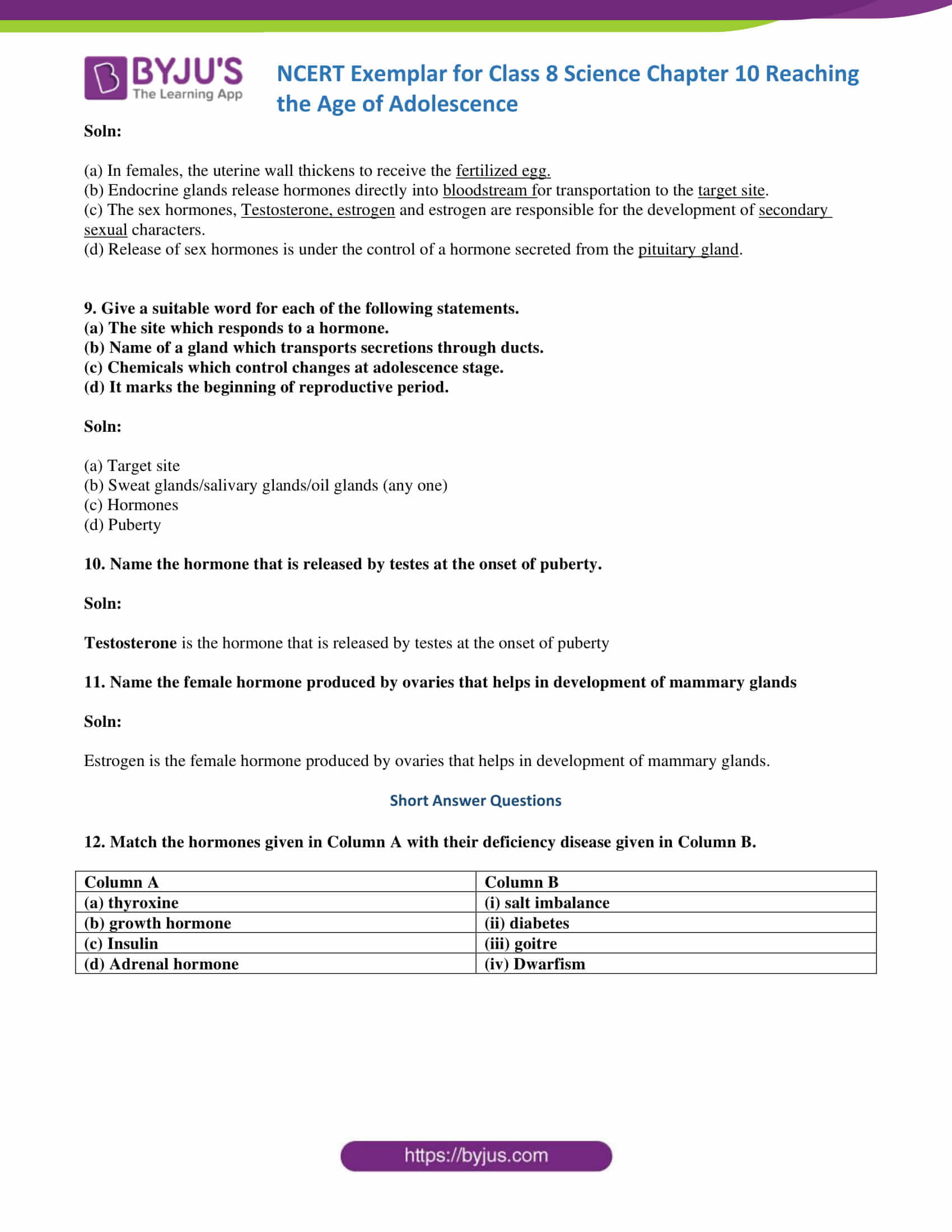
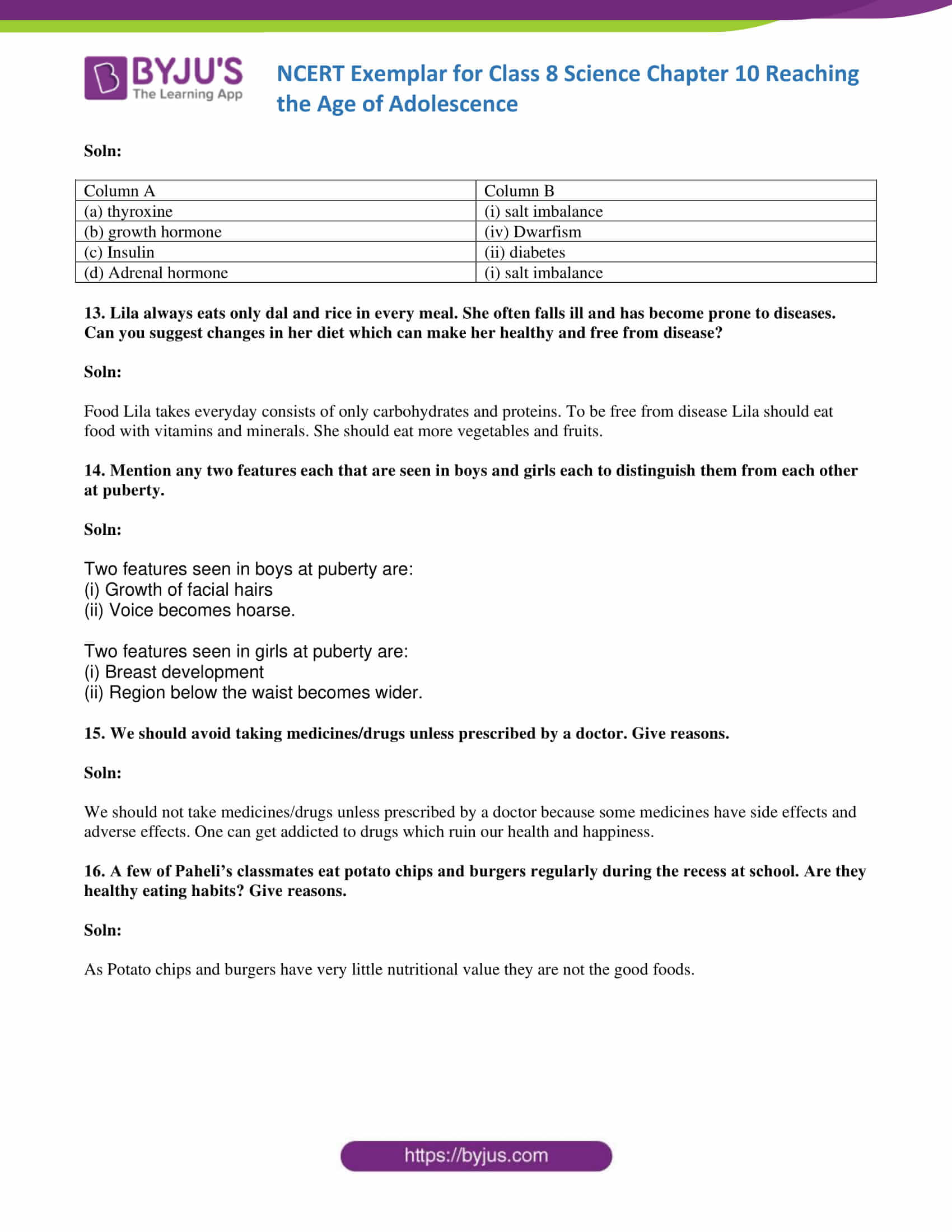
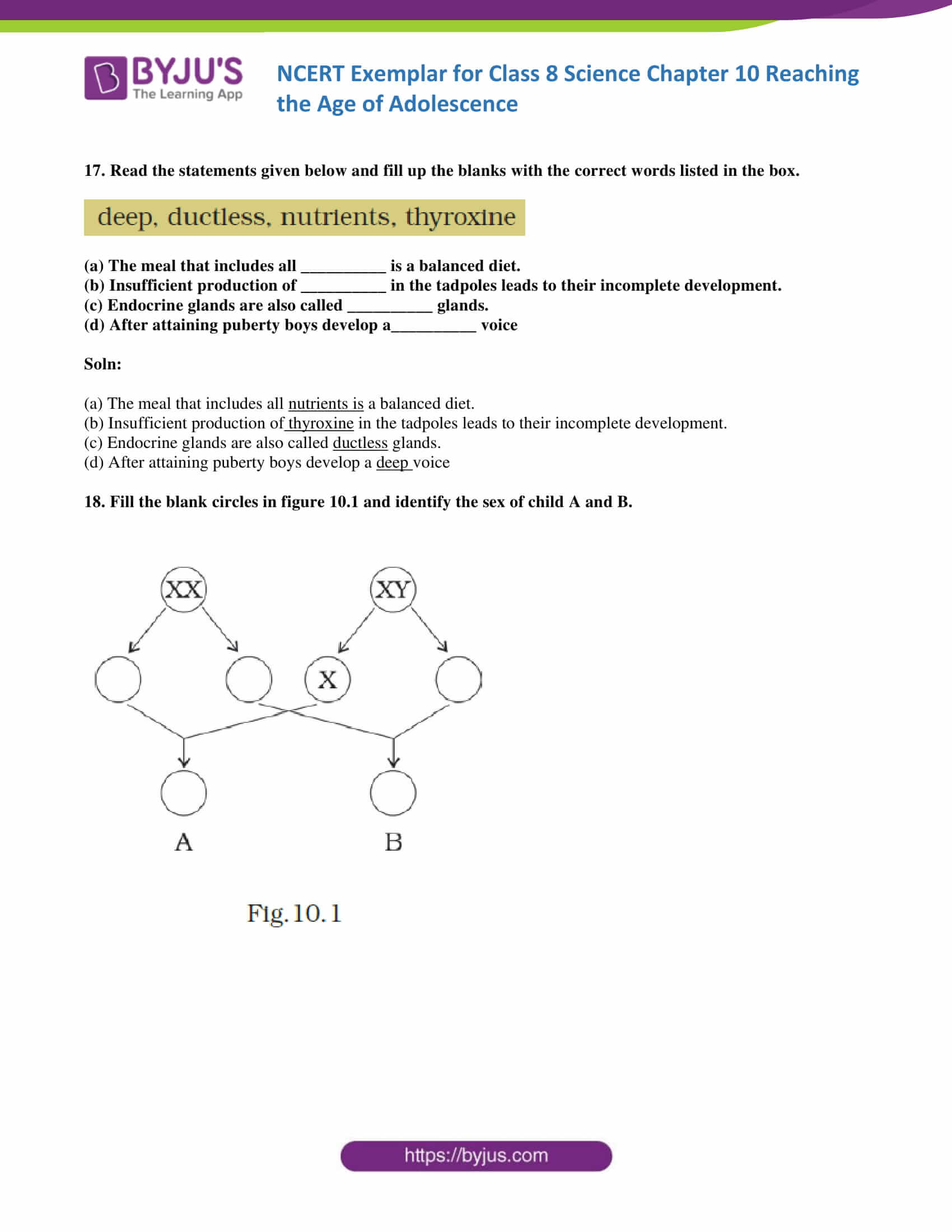
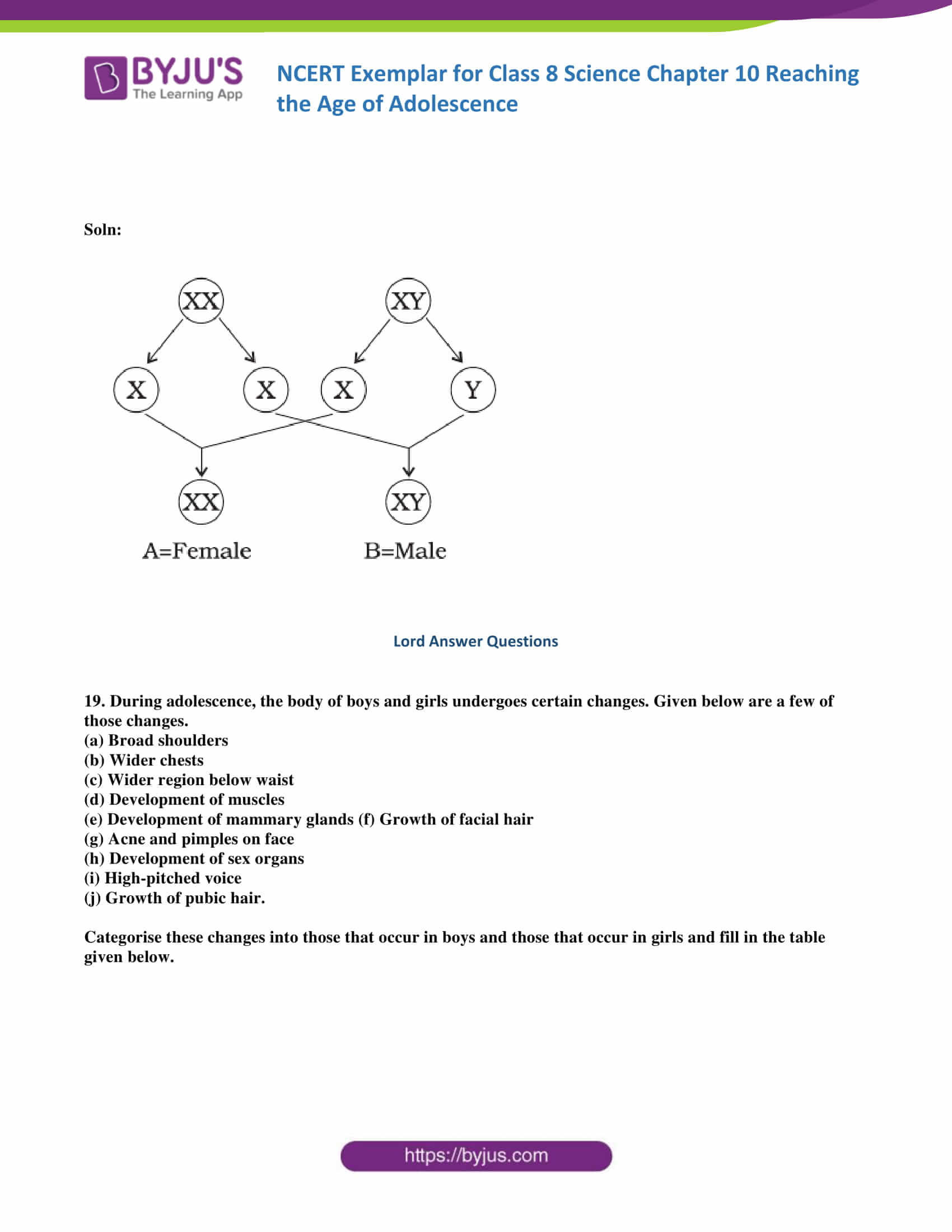
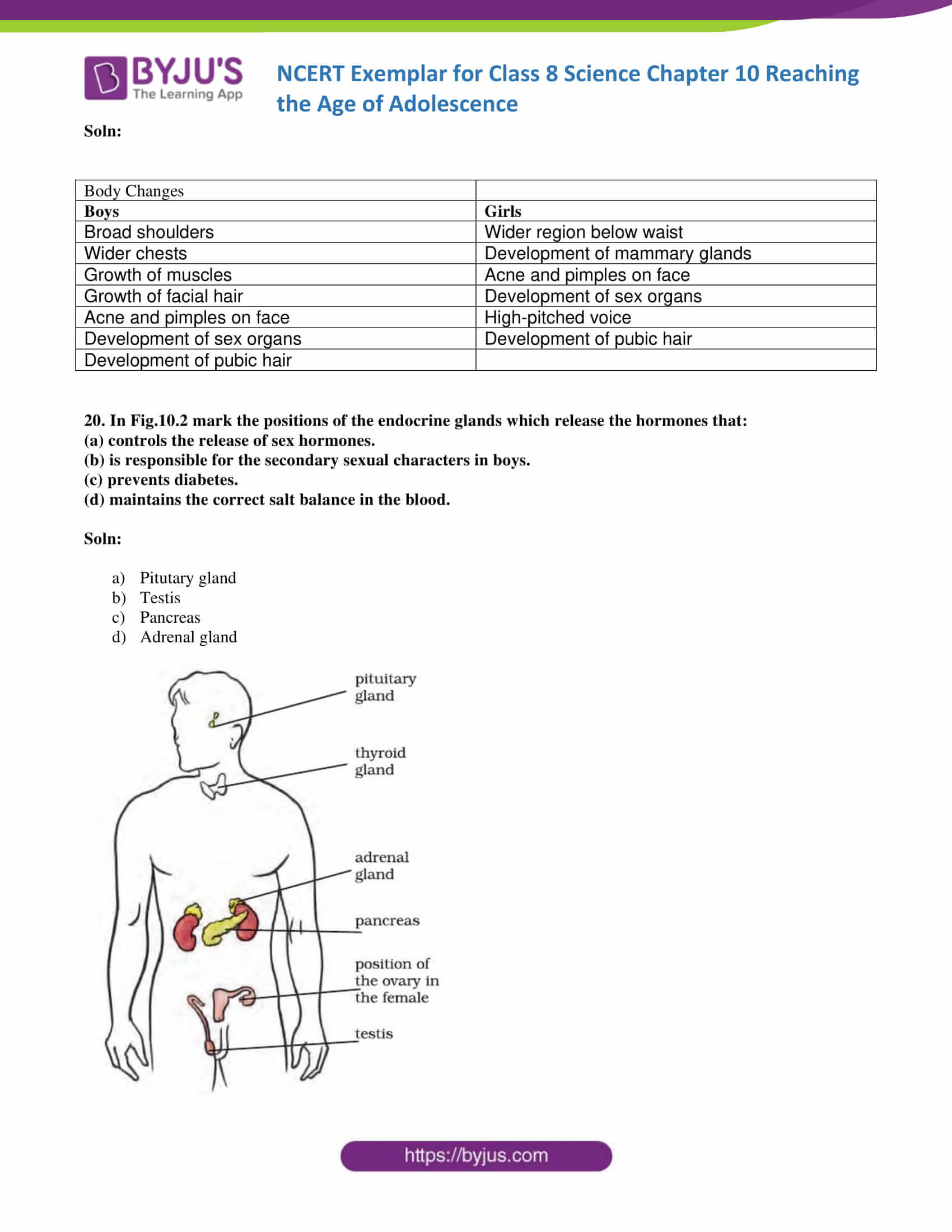
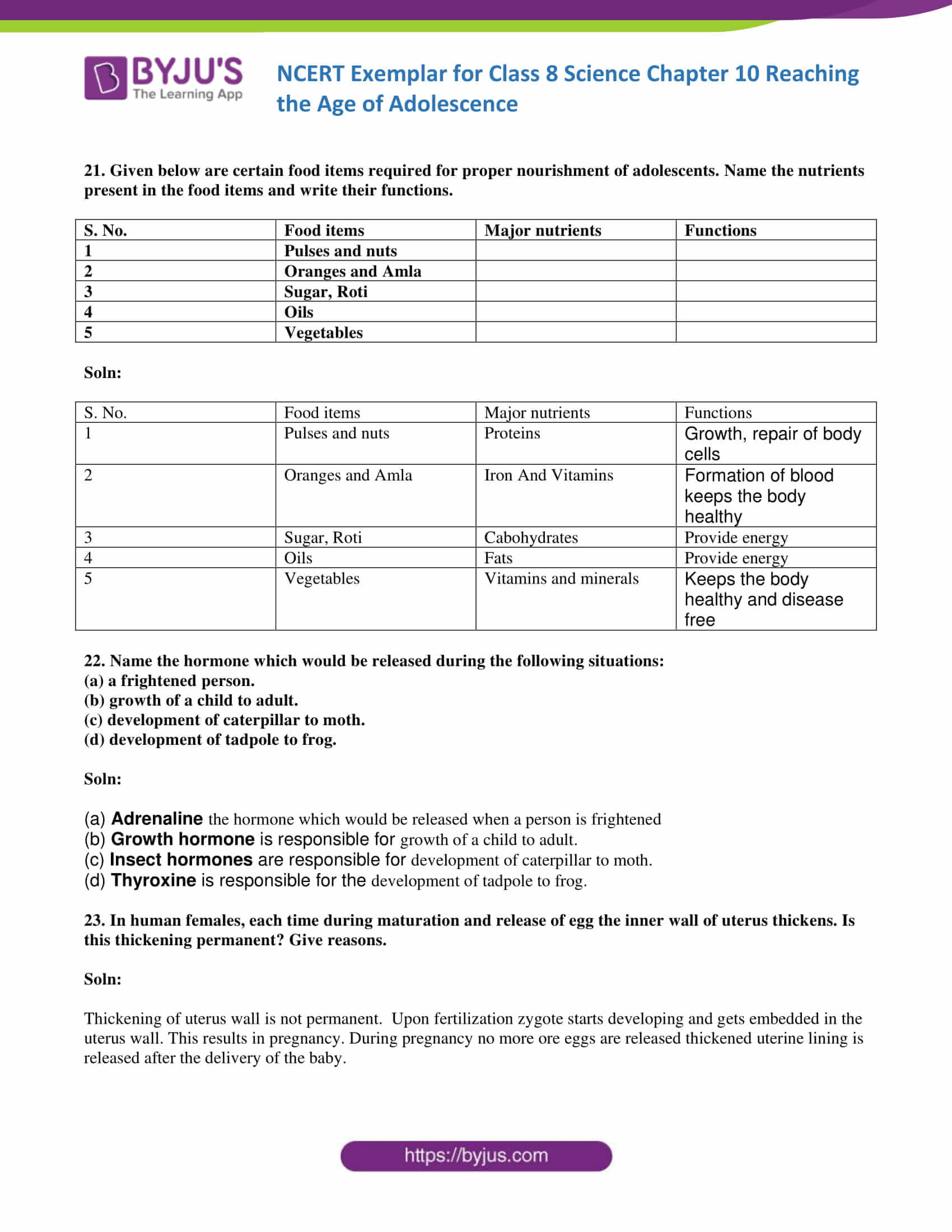
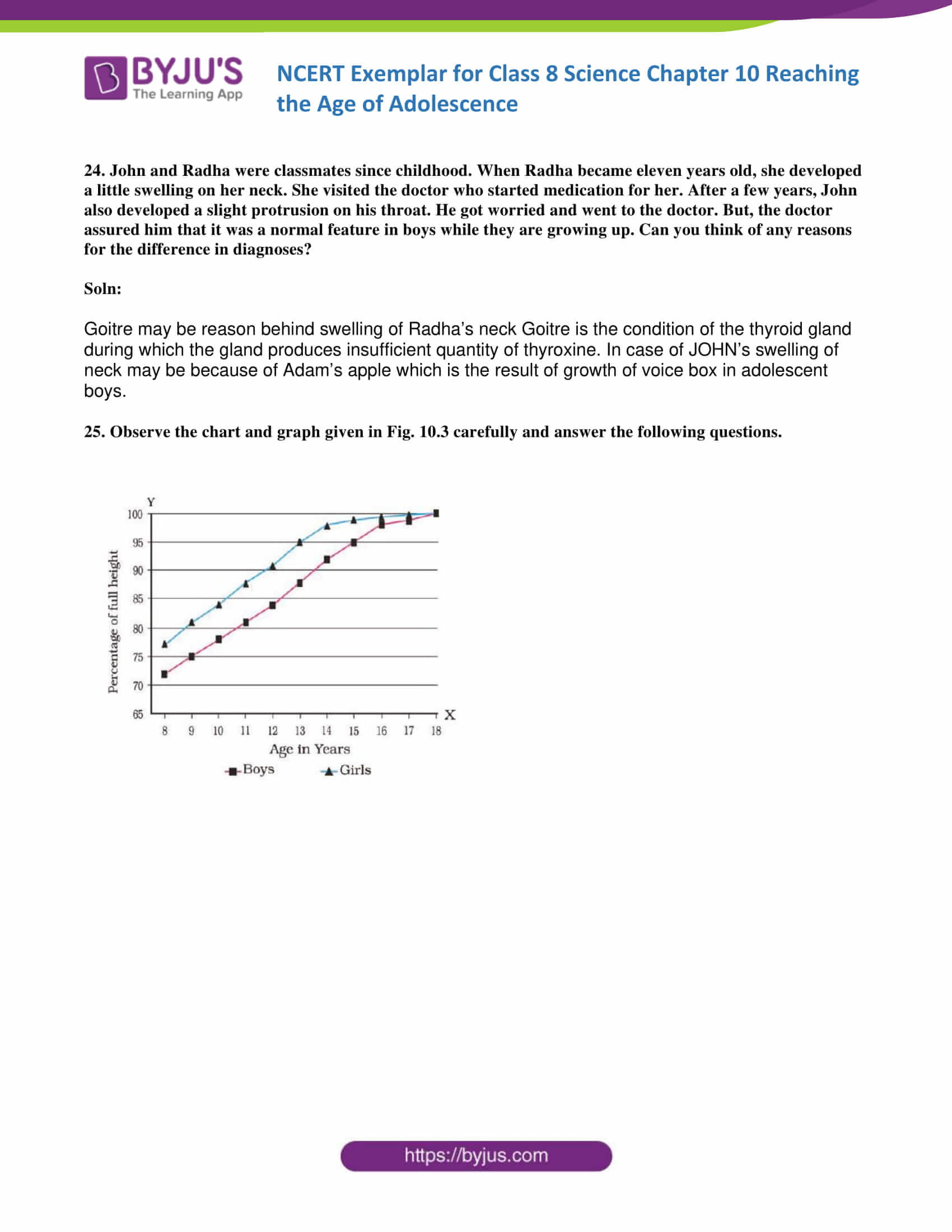
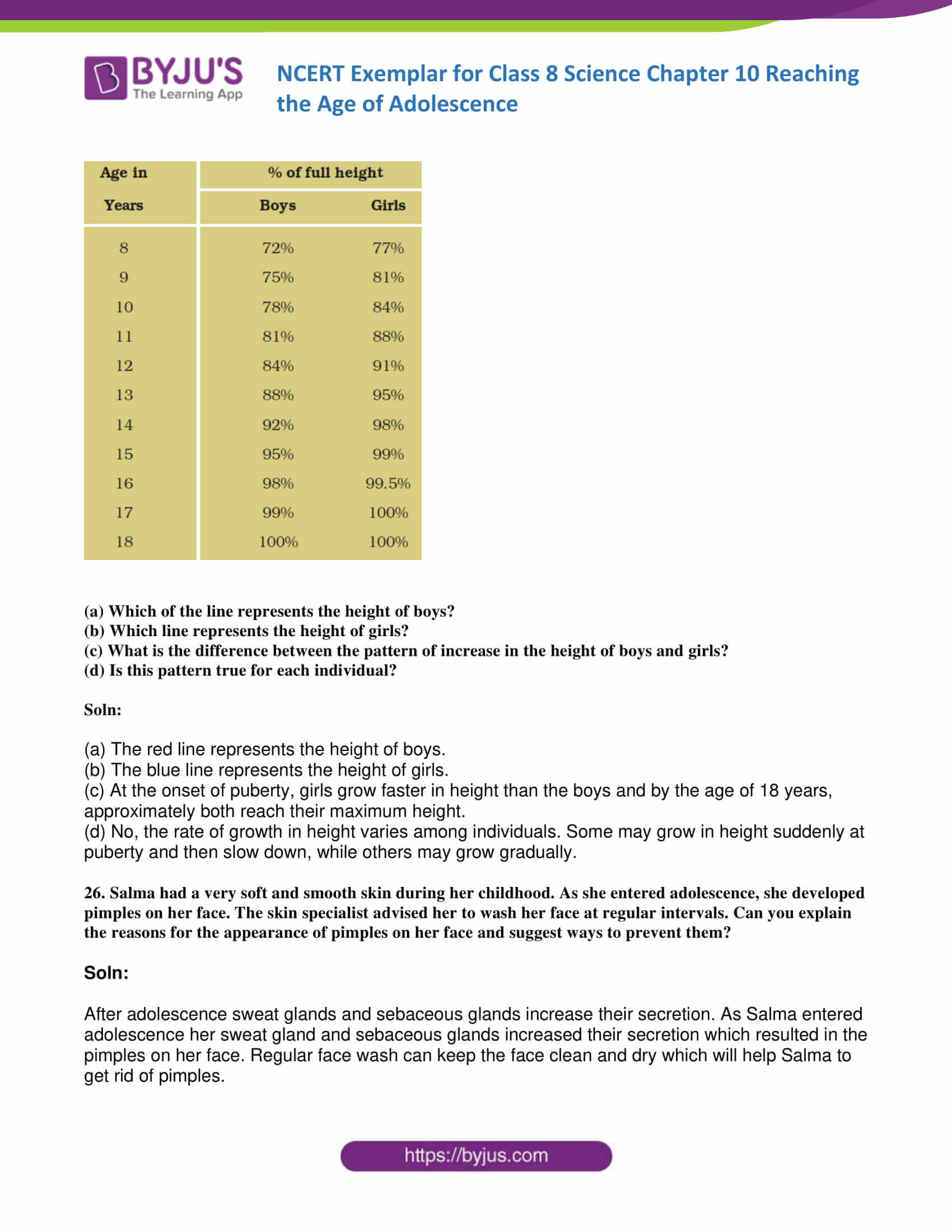
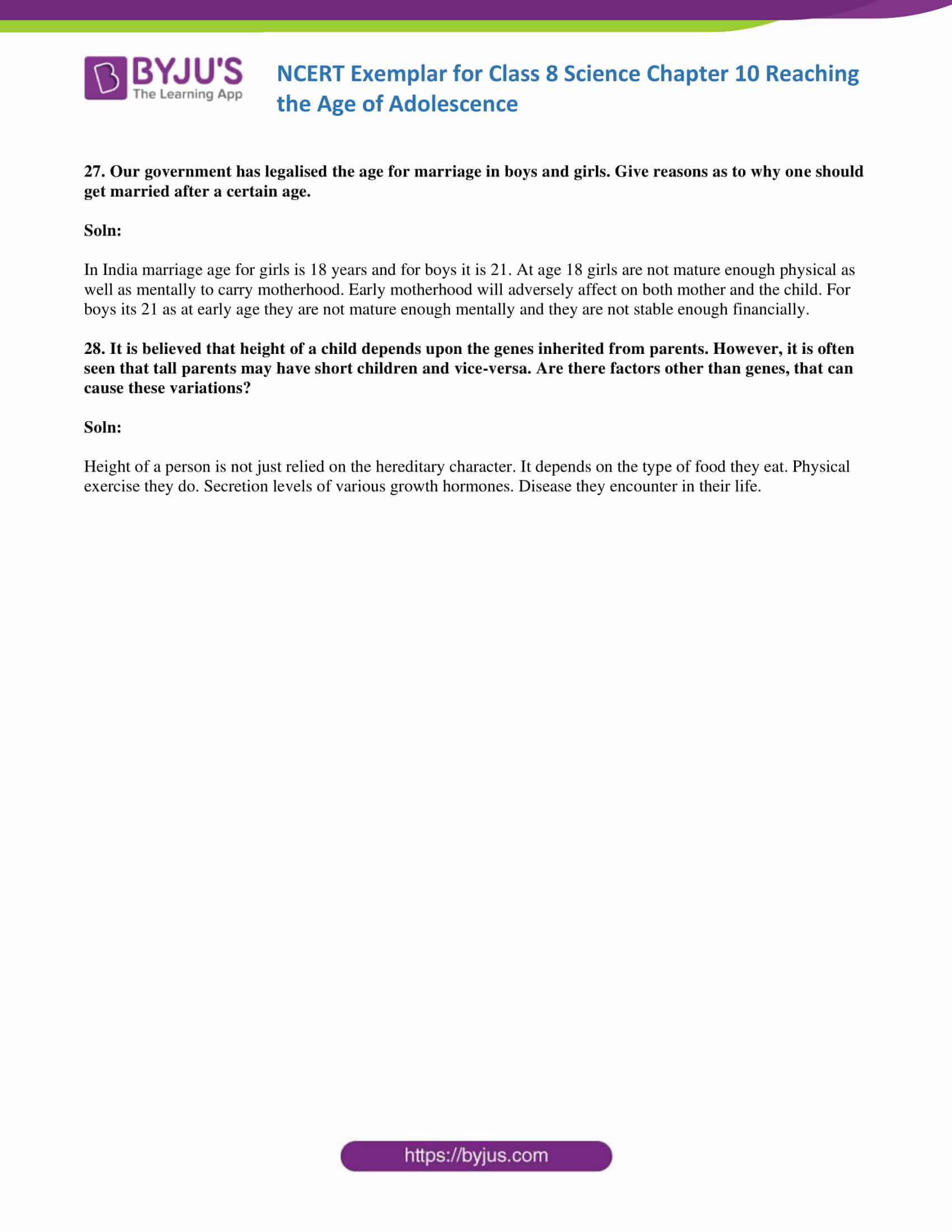
Comments